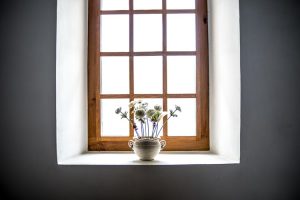The leaks around windows and doors in an average home can be the cause of losing up to 30% of the homes heating and cooling. If your windows are in good condition you can take some steps to reduce the energy loss but you may want to consider replacement of these if they are over 10 years old.
Steps to make your windows more energy efficient:
- Find and seal the gaps with weather stripping or caulking.
- Install double glazing. This will give you two layers of glass separated by a layer of air. This will help to keep the warm air in and the cold air out. It also will reduce noise. Adding a layer of glass must be done carefully but it can be done and is cheaper than replacing the window.
- Upgrading the window frames costs less than new windows. Choosing a frame with an efficiency rating of 5 will be the most efficient.
- Use window treatments that will block drafts. Heavy curtains and thermal curtains will give the best effect.
- Install window film. Window film is one of the best ways to make your windows more efficient. Solar control window film will protect you on sunny days.
Replacing your old windows can save you $100-$450 per year. Your savings will depend on your climate, your home construction, and your windows’ energy efficiency rating. There are different types of windows and different energy efficiency ratings.
Types of windows for the most efficiency:
- Double hung windows are windows where the bottom half slides up to open the window. In really extreme climates this may not be the best choice because of the air intrusion between the sliders.
- Casement windows are a good choice where wind is an issue. These windows have cranks to open the window outward. They seal themselves tighter when the wind blows toward the house. You will have to maintain the hinges and seals to ensure their efficiency.
- Picture windows typically don’t open and glass choice is important.
Energy performance ratings are based on the rate of heat loss from a building and is indicated as the U‑factor. U‑Factor ratings for windows are usually between .2 and 1.2. The lower the number, the greater the efficiency. The SHGC or solar heat gain coefficient will tell you how well a product will block heat from the sun. The number will be between 0 and 1. The lower the number the better.
Window frames are something else to consider when replacing windows.
- Vinyl frames are a less expensive material but if well constructed and properly installed can offer excellent energy efficiency.
- Wood frames have the best insulative value but will have to have more upkeep than other types of frames.
- Aluminum may not be the best for heat transfer loss but is a good choice if you live in a rainy and/or humid area.
- Wood-clad frames have low maintenance exterior (usually vinyl or aluminum) encasing a temperature-transfer-resistant wood interior. The clad windows can have water intrusion and cause rotting so this may not be the best choice in wet climates.
As you can see, there are many things to consider when replacing windows. Local window companies can advise you on the best options for your home or business.
If replacement is not an option, you can also save money by choosing a third party energy supplier with better rates than utility companies. Triple “S” Energy Management can provide you with a free and complete energy audit and discuss your options for the best available rate for your business. Give us a call to get started today.


